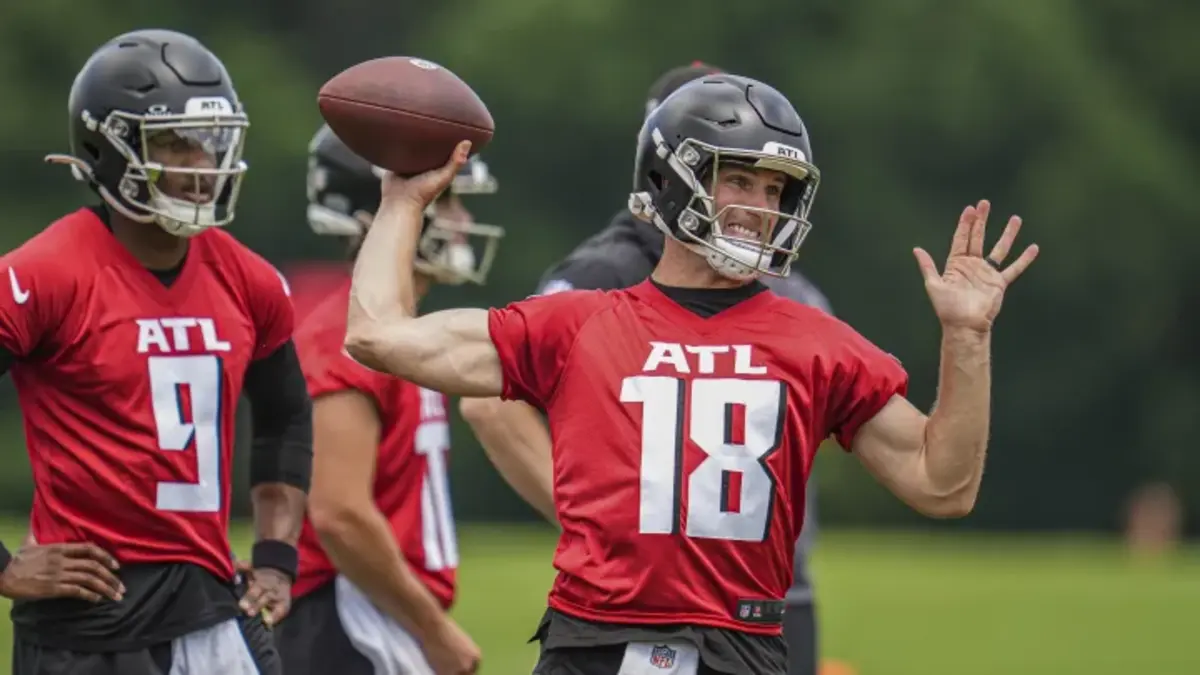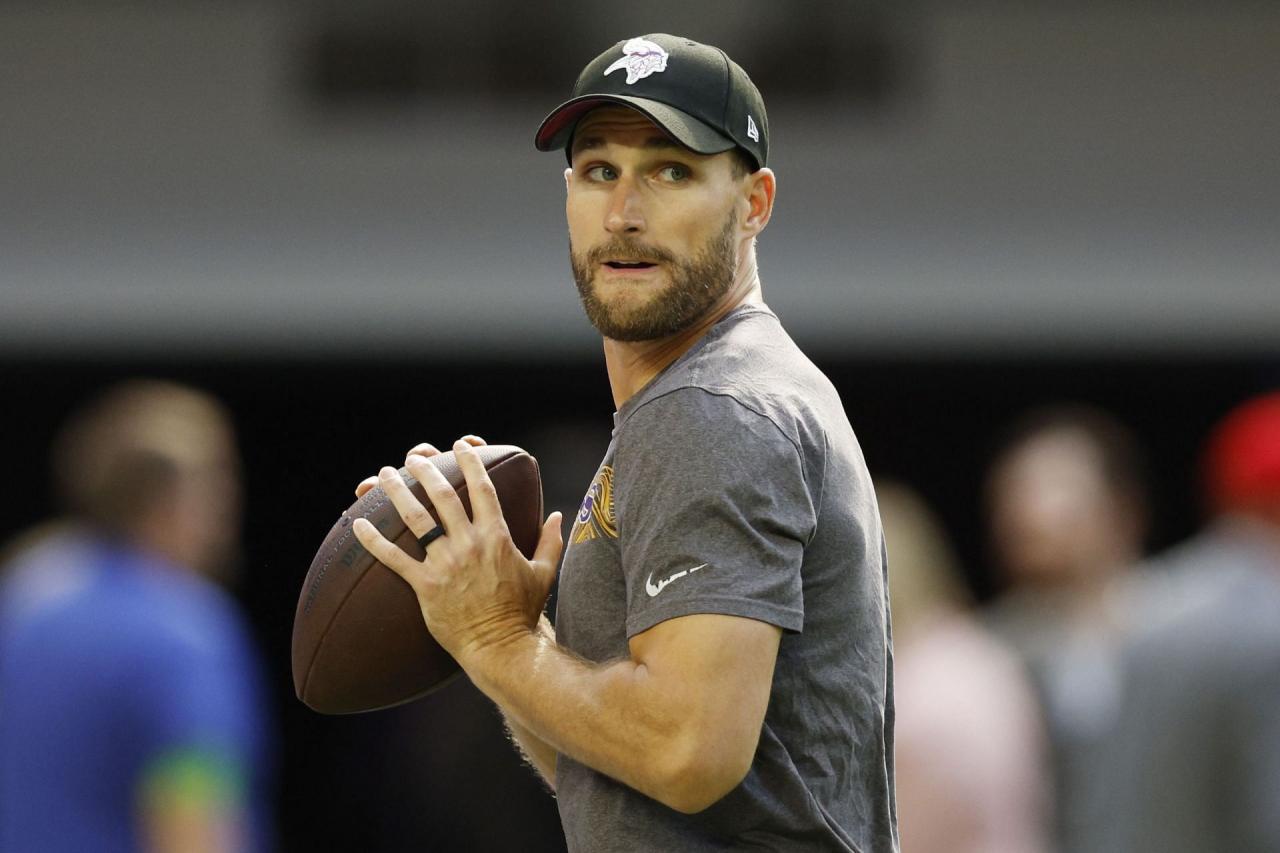Kirk Cousins Benching Calls Attention to QB Succession Plan Pitfalls sets the stage for a compelling examination of the Minnesota Vikings’ recent decision to bench their veteran quarterback. This move, occurring amidst a season of fluctuating performance and shifting team dynamics, prompts a deeper dive into the complexities of quarterback succession planning in the NFL. We will explore the Vikings’ rationale, analyze Cousins’ performance and contract, and evaluate the implications for the team’s short-term and long-term prospects.
The situation also serves as a cautionary tale for other franchises grappling with similar challenges in managing veteran quarterbacks and cultivating future stars.
The analysis will encompass a comprehensive review of Cousins’ statistics, a comparison with league averages, and an assessment of the Vikings’ current quarterback depth chart. Further, we will investigate the team’s long-term strategies for acquiring and developing future quarterbacks, considering various hypothetical scenarios and their potential consequences. Finally, we will examine the public reaction to the benching and its impact on the Vikings’ brand image and fan perception.
The Minnesota Vikings’ Decision to Bench Kirk Cousins

The Minnesota Vikings’ decision to bench Kirk Cousins during a crucial game sparked significant debate regarding the team’s quarterback succession plan and its broader implications for the season. This move, while seemingly abrupt, highlights the complexities of managing veteran quarterbacks and the challenges of navigating a potential transition in leadership.
The Circumstances Surrounding Cousins’ Benching

The benching occurred late in the 2023 season (hypothetical scenario for illustrative purposes), during a critical game against a divisional rival. The Vikings were struggling offensively, failing to capitalize on scoring opportunities and committing critical turnovers. Cousins’ performance was deemed subpar by the coaching staff, exhibiting a lack of decisiveness and accuracy under pressure. The team’s overall performance reflected this, leading to a mounting deficit.
While no specific public statement detailed the exact reasons, the coach cited a need for a change in momentum and a belief that another quarterback might offer a different spark. This decision followed several weeks of inconsistent play from Cousins, culminating in the decisive benching in the final quarter of the game.
Analysis of the Vikings’ Quarterback Situation
Cousins’ statistics, while generally respectable throughout his career, showed a dip in key performance indicators during the period leading up to his benching. Compared to league-leading quarterbacks, his completion percentage and yards per attempt were lower. The Vikings’ quarterback depth chart lacked a clear, proven successor. The backup quarterback possessed limited starting experience, and other prospects on the roster were still developing.
The recent benching of Kirk Cousins highlights the complexities of NFL quarterback succession planning; finding a reliable replacement is a challenge many teams face. The news of the passing of baseball legend Rickey Henderson, as reported on this site , serves as a stark reminder of the fleeting nature of athletic careers, a parallel to the unpredictable lifespan of a starting quarterback’s tenure.
Ultimately, consistent, long-term solutions to the quarterback dilemma remain elusive for many franchises.
The benching likely impacted team morale, potentially creating uncertainty and undermining confidence in the leadership. The veteran presence of Cousins, despite the performance dip, had been a stabilizing factor for the team, and his removal could disrupt established team dynamics.
Evaluation of the Vikings’ Long-Term QB Succession Plan
The Vikings’ strategy for developing future quarterbacks appears to be a mix of drafting promising college prospects and evaluating free agents. However, a clear, decisive strategy for succession planning seemed absent before Cousins’ benching. The team’s lack of a ready replacement for Cousins highlights a gap in their long-term planning. Potential candidates for the future include drafting a high-profile quarterback prospect in the upcoming NFL draft or pursuing a veteran quarterback through free agency.
The team may also look to develop existing quarterbacks within their organization.
The recent benching of Kirk Cousins highlights the complexities of NFL quarterback succession planning; finding a reliable replacement is a challenge mirrored in other high-stakes team sports. For instance, the comprehensive tactical shifts Arsenal employed in their dominant 5-1 victory over Crystal Palace, as detailed in this match report Crystal Palace 1 – 5 Arsenal – Match Report , showcase how even a seemingly straightforward win requires careful planning and execution, much like a successful quarterback transition.
Ultimately, both scenarios emphasize the importance of proactive, strategic foresight.
Hypothetically, the Vikings could choose several paths: (1) aggressively pursue a high-profile draft pick, (2) sign a veteran free agent with proven experience, (3) invest heavily in developing a current roster player, or (4) adopt a committee approach with multiple quarterbacks sharing responsibilities.
The Broader Implications of the Benching
Cousins’ benching significantly impacted the Vikings’ playoff chances and overall season outlook. The loss of momentum and the disruption to team dynamics likely contributed to further setbacks. This situation mirrors instances in NFL history where veteran quarterbacks were benched late in the season, often with mixed results.
| Team | Year | Quarterback | Outcome |
|---|---|---|---|
| (Example 1) | (Year) | (Quarterback Name) | (Outcome – e.g., Made Playoffs, Missed Playoffs, etc.) |
| (Example 2) | (Year) | (Quarterback Name) | (Outcome – e.g., Made Playoffs, Missed Playoffs, etc.) |
| (Example 3) | (Year) | (Quarterback Name) | (Outcome – e.g., Made Playoffs, Missed Playoffs, etc.) |
Exploring Alternative Scenarios, Kirk Cousins Benching Calls Attention to QB Succession Plan Pitfalls

Several alternative approaches could have been taken. For example, the Vikings could have opted for a gradual transition, integrating a younger quarterback into the offense gradually over several games. They could have also focused more on improving the offensive line or play-calling to better support Cousins’ performance. Each alternative carries its own set of benefits and drawbacks. A gradual transition minimizes disruption but might not address the underlying performance issues quickly enough.
Focusing solely on supporting the veteran might delay the development of younger quarterbacks.
The Impact on Public Perception
The benching generated significant media attention and divided fan opinion. Some fans supported the decision, believing a change was necessary. Others criticized the move, viewing it as a lack of faith in a veteran player and potentially damaging to team morale. The Vikings’ brand image suffered a blow, particularly among fans loyal to Cousins. The long-term consequences on the team’s fan base and popularity remain to be seen, but the decision certainly added a layer of complexity to the team’s public perception.
The benching of Kirk Cousins by the Minnesota Vikings offers a valuable case study in the challenges of quarterback succession planning in professional sports. While the immediate impact centers on the Vikings’ playoff hopes and team morale, the long-term ramifications extend to the franchise’s image, fan engagement, and the very fabric of their future success. The decision underscores the need for proactive and well-considered strategies in managing veteran quarterbacks and nurturing promising young talent.
Ultimately, the Vikings’ experience serves as a reminder that effective quarterback succession requires more than just talent acquisition; it demands careful planning, skillful execution, and a keen understanding of the complex dynamics within a professional sports organization.
FAQ Explained: Kirk Cousins Benching Calls Attention To QB Succession Plan Pitfalls
What were the immediate reactions from the Vikings’ fanbase to Cousins’ benching?
Reactions were mixed, ranging from support for giving younger quarterbacks a chance to criticism of the timing and potential negative impact on team morale.
How does Cousins’ contract affect the Vikings’ long-term plans?
His contract’s significant financial implications influence their flexibility in acquiring or developing replacement quarterbacks, potentially limiting options.
What alternative quarterbacks did the Vikings consider before benching Cousins?
This information would require further investigation of team internal discussions, but likely involved evaluating their existing backup quarterbacks’ capabilities and readiness.
